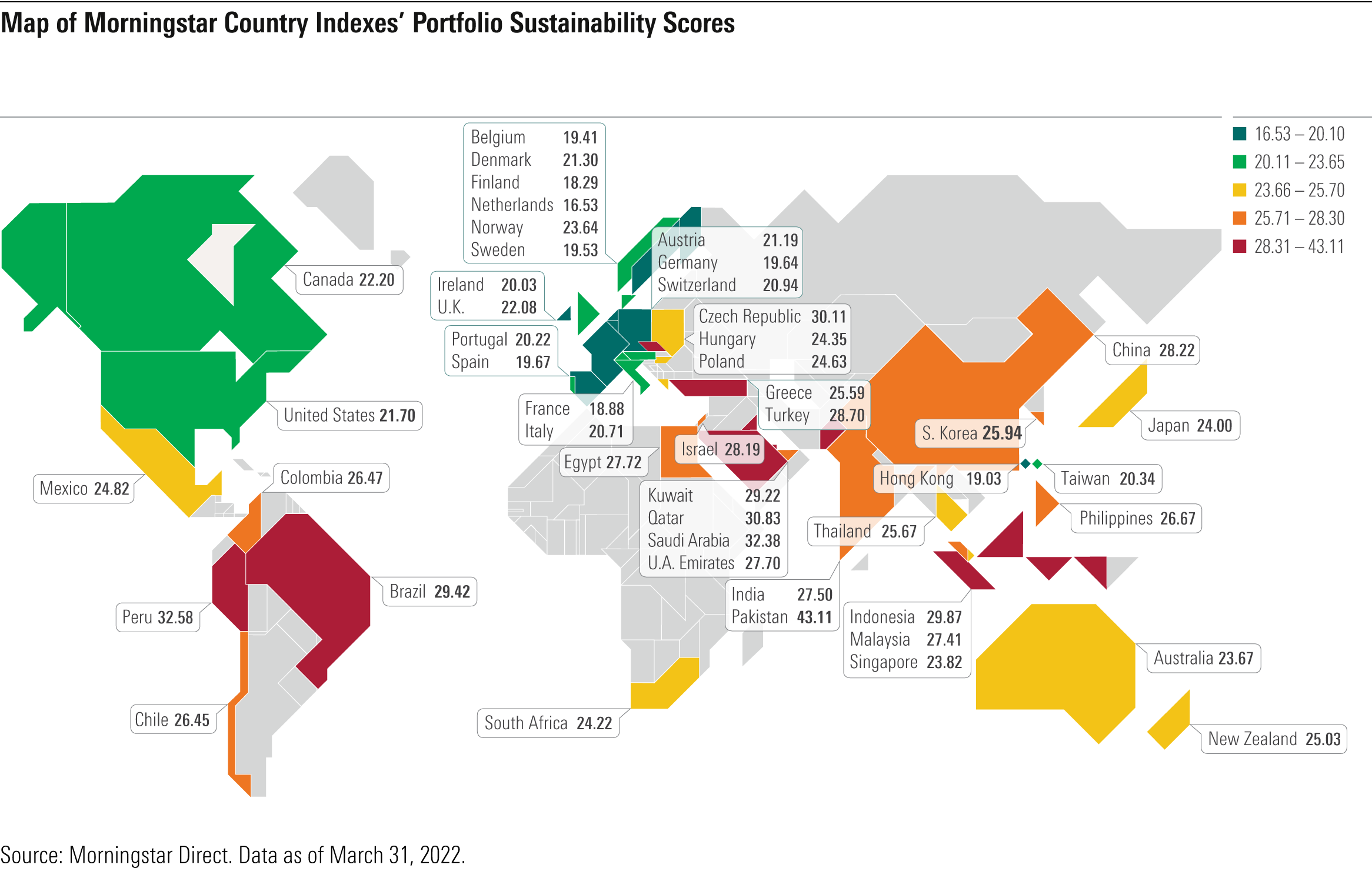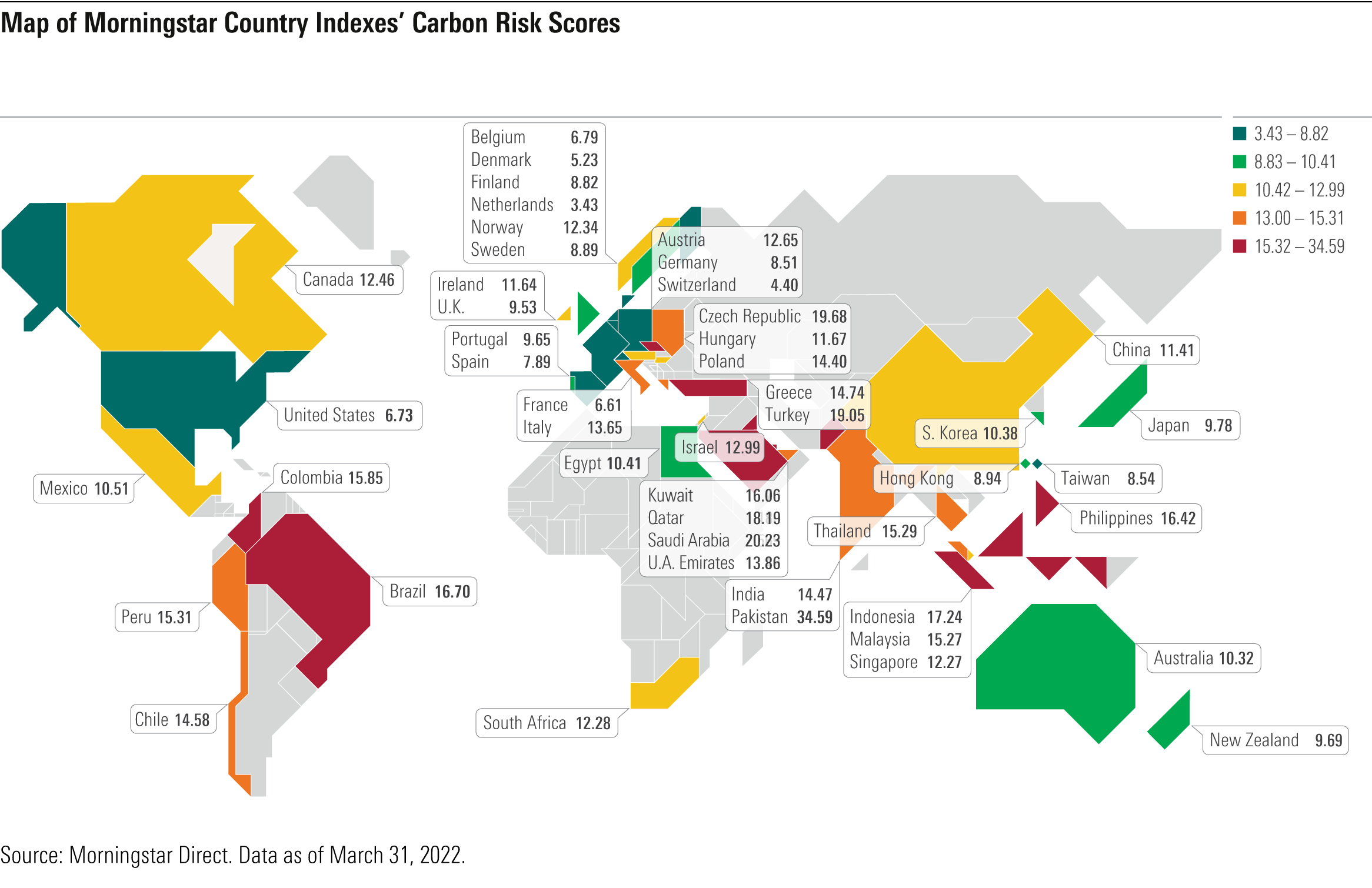Mapping ESG Practices and Carbon Risk in 48 Countries' Stock Markets
Despite being home to several sustainability leaders, the U.S.' overall ranking is dragged down by a few companies with high ESG risks.

The market and political turmoil brought about by Russia's invasion of Ukraine has provoked much discussion on sustainable investing, especially around values-based exclusions (military contractors and fossil fuels, above all). However, as Morningstar's director of sustainability research for the Americas Jon Hale put it, such critiques are unsupported by the data. For the most part, these claims reflect a total lack of understanding of the diversity of the field.
One of the economic lessons to emerge from this conflict concerns the risk in investing in countries where politics can strongly condition free economic activity and where corporate governance is affected by rules set by the person in charge. In the end, when it comes to investing in autocratic countries such as Russia, the normal rules of picking stocks and bonds can be rendered irrelevant overnight.
Despite all the challenges of the moment, the long-term case for environmental, social, and governance investing remains encouraging. The fact that ESG screens led to resilience during the pandemic-driven market turmoil, owing to the relationship between sustainability and attributes like corporate quality and financial health, supports the view that ESG risk is material.
So, from a geographical point of view, how do countries around the world compare on this front? According to the latest edition of the Morningstar Sustainability Atlas, European countries--particularly those in the north--lead the pack in ESG practices. These nations have always been ahead of the curve on ESG, but a few other countries also feature exceptionally strong sustainability profiles. Financial advisors and asset managers can use this data to identify countries with the greatest ESG investment opportunities and most significant risks.
The Morningstar Sustainability Atlas uses the constituents of Morningstar country indexes to examine the sustainability profiles of 48 country-specific equity markets. The company-level scores are sourced from Sustainalytics, which is a Morningstar company whose metrics also power the Morningstar Sustainability Rating for funds.
Here, we explore some key findings about the ESG practices of countries around the world.
Morningstar Portfolio Sustainability Scores: The Netherlands Maintains Its Spot at the Top, China Plummets
As with previous editions of the Sustainability Atlas, the Netherlands continues to have the world's most sustainable stock market.
Behind the Netherlands, Finland overtakes France for second place in the rankings. This is primarily due to big companies like Nokia NOK, a leader within the global technology hardware industry, and Sampo, another important name in the insurance services' sector.
France falls to third place. Important French constituents like global producer and distributor of luxury goods LVMH, electrical equipment supplier Schneider Electric, and personal-care company L'Oréal are classified as ESG leaders in their industries.
Particularly noteworthy is Belgium, which rebounds from 18th place in 2021 to fifth place this year, thanks to the excellent performance of KBC Group. At the same time, Taiwan slips from fifth to 11th place. Spain loses two positions to eighth place, while Sweden climbs from seventh to sixth place.
Hong Kong ranks fourth and is the most sustainable non-European market. Insurance company AIA Group--by far the biggest name within the benchmark--combines low risk exposure with strong management.

The United States ranks 16th out of 48. U.S. companies like Apple AAPL, Microsoft MSFT, Berkshire Hathaway BRK.A, and Nvidia NVDA are considered leaders from a sustainability point of view; on the other hand, the Sustainalytics ESG Risk Ratings for big names such as Amazon.com AMZN, Meta FB, and Exxon Mobil XOM are classified as High. This is attributable in most cases to the companies' involvement in controversies.
For example, Amazon's disruptive expansion has led to rapid growth but has drawn intense scrutiny from regulators, governments, and competitors for potential breaches of antitrust laws and anticompetitive behavior. The coronavirus pandemic indicated more systemic occupational health and safety issues, particularly among the warehouse employees, who were exposed to poor safety measures during the pandemic's early stages.
At the same time, Meta continues to face multiple lawsuits and fines over privacy violations and its data usage practices, suggesting gaps in management's controls.
China lands at the bottom of the fourth quintile, ranking 39th out of the 48 markets, and losing nine positions compared with last year. Internet giant Tencent is the biggest name within the index, followed by Alibaba BABA. Both companies hold a Medium ESG Risk Rating and have a concerning involvement in controversies.
Which Countries Have the Lowest Carbon Risk?
Another important consideration is climate change. Despite the progress made at COP26--the 2021 United Nations Climate Change Conference—with several new pledges for adaptation funding, developed nations are still failing to meet their $100 billion-per-year climate financing commitment made in 2009. At the same time, world leaders met to finalize the rules needed for the Paris Agreement and resolve issues from the last conference.
Climate change might threaten companies' physical assets or business models. They may be affected by policy or regulation aimed at lowering greenhouse gas emissions, their fossil fuel assets may be stranded, or changing popular perception may damage their brands. We use the Morningstar Portfolio Carbon Risk Score to assess the degree to which corporate value is at risk from the transition to a low-carbon economy.
Western European markets like the Netherlands, Switzerland, Denmark, France, Belgium, and Spain carry the lowest levels of carbon risk. The U.S. also scores very well, ranking fifth out of 48. A low level of the American stock market value is at risk from the transition to a low-carbon economy because of its technology and healthcare tilt and minimal exposure to energy and utilities.
On the flip side is Pakistan, with nearly 60% of its market cap in energy, utilities, and basic-materials stocks. It consequently has the world's highest Portfolio Carbon Risk Score. Also carrying significant Portfolio Carbon Risk Scores are energy-heavy markets Saudi Arabia, Czech Republic, and Qatar. The full set of rankings is shown in the map below.

Important Note: In light of the Russian invasion of Ukraine and the resulting sanctions issued by the U.S., European Union, and United Kingdom, Morningstar moved the Russia equity market from emerging-markets status to unclassified. This took effect at the rebalance after the market close on March 18, 2022, when all Russia equity securities, including ADRs and GDRs, were removed from the Morningstar Global Markets and Morningstar Target Market Exposure index families at a price of zero. This reflects the fact that many investors outside of Russia can no longer trade these securities. Consequently, the Russian equity market was not taken into consideration for this analysis.


/cloudfront-us-east-1.images.arcpublishing.com/morningstar/XTXQYAMAL5EKRLGIS3IDVAZ3R4.png)
/cloudfront-us-east-1.images.arcpublishing.com/morningstar/3J75DKCBIZCTJMRFWSSJSHHCJ4.png)
/cloudfront-us-east-1.images.arcpublishing.com/morningstar/DJVWK4TWZBCJZJOMX425TEY2KQ.png)